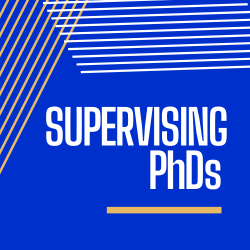By Dr Kay Guccione

“The hidden curriculum in doctoral education comprises all unofficial mechanisms of learning that take place within and outwith academia. The hidden curriculum is recognised as genuine sites of learning that offer the potential to develop and support learners’ academic, personal, social and psychological needs. Whereas the starting point in the pursuit of the hidden curriculum tends to be driven by doctoral researchers’ ownership of this personal process, the entire doctoral ecology recognises that there are key ‘hidden curriculum agents’ who are able to support, empower and enable doctoral researchers in creating learning pathways that are strategically intended to harness a tailored hidden curriculum based on personal needs and professional aspirations.” (Elliot et al, 2020) – read the Hidden Curriculum of Doctoral Education blog here.
A collaborative framework for doctoral development
Doctoral education involves a complex mesh of learning including gaining disciplinary research approaches, academic competencies and conventions, and employability-based ‘skills training’ rationalised through learning the arts of reflective practice, self-governance and project management.
Understandably then, the responsibility for meaningful doctoral researcher learning is a ‘shared endeavour’ comprising networks of players across institutions and disciplines: supervisors, PGR tutors or convenors or directors of studies, researcher development professionals, doctoral programme administrators and course coordinators, colleagues and associates in the dept and in the discipline, public engagement specialists, research impact managers, research librarians and those accountable for the responsible use and open reporting of research data, English Language support centres, academic skills and academic writing facilitators, disability advisors, counsellors and wellbeing staff, digital learning technologists, friends, family, and digital social networks.
Each actor plays a role in supporting learning via the formal or the hidden doctoral curriculum and/or in the shaping of the doctoral learning environment as a professional and social space. Taken together, the landscape for doctoral learning is rich and complex, but can also be overwhelming.
Navigating a rich tapestry of opportunity
Within this dynamic intertwined mesh of players, each with their own contributions and agendas there is a huge potential for doctoral researchers to receive conflicting messages about what the most important and more urgent aspects of the doctoral learning experience are. It is a well-voiced concern that doctoral researchers can feel they are stressfully overloaded with opportunities and experience this as added ‘pressure’. As novices, they do not always know which opportunities to choose. It may be hard within such a rich collaborative framework for learning for them to discern which of these learning opportunities are part of the expected formal curriculum, which belong to the hidden curriculum and can be tapped into to support their developing researcher identity, and even which are irrelevant to them at this time.
This is an important consideration; if we as supervisors are not careful to create a scaffold for seeking and engaging with learning in partnership with the doctoral researcher, we set up the potential for researchers to feel out of control, and that they are wasting time, energy, and focus, ultimately leading to stress and even to diminished mental health.
Yet, access to meaningful development activities, opportunities to meet peers and build personal and professional networks, and the quality of supervisory relationships in enabling this, are key factors that contribute to the perceived value that researchers derive from their doctoral degree (Bryan and Guccione, 2018). These benefits then impacted on graduates’ post-PhD careers, long-term friendships, sense of self, and judgement about whether the PhD had been ‘worth it’. It is worth noting that the doctoral graduates in this study remarked that it was the ‘extra-curricular’ opportunities, i.e. learning that lies outside the formal curriculum of research work that they valued the most – both personally and professionally.
The importance given to these opportunities outside the ‘formal curriculum’ means that from the start of the doctorate, navigating the formal and the hidden curricula, and the intersection between the two can be argued to be of the utmost importance.
Supervisors supporting meaningful learning should support each individual doctoral researcher to navigate and prioritise their own formal and hidden curricula, to avoid them feeling like an overwhelmed victim of the competing systems. Rationalising the offers, opportunities, and tacit expectations with a view to constructing their owncoherent and aligned goals for their own development is an empowering act. Supporting PGRs to rationalise and discern which development activities, people, networks and communities to engage with gives them a sense of control and ownership over their doctoral studies, and so supports good mental wellbeing.
The REPAIRS Model (Elliot et al, 2020)
REPAIRS is a conceptual model, which can be used in partnership with PGRs through the whole PhD journey to frame a discussion of how to navigate and manage the formal and hidden curricula:
Receptivity: Being presented at once with unfamiliar people, academic language and ideas, working patterns, styles and systems, networks, and modes of communication, can be overwhelming. Yet, having an ‘open’ disposition – the courage to step out of one’s comfort zone by not dismissing new ideas because they are ‘different’ or ‘untried’, is a key step in ‘trying on’ what the hidden curriculum can offer.
Embrace: Even with openness to new experiences, not every idea or new piece of information will be to one’s advantage, taste or preference. There is, therefore, no pressure to accommodate everything, especially since it is simply not possible to do so. Instead, exercise selectivity as to what one can embrace.
Passion: In deciding what to pursue, doctoral researchers shou be allowed some space to follow their passion – having some time to engage with what they are genuinely interested in. Doing so is not only likely to stimulate genuine enjoyment but also tends to create an upward spiral of positive feelings and experiences (Fredrickson, 2003) which motivate.
Active engagement: A sense of camaraderie and enjoyment from participation in the workshops, networks and relationships that facilitate learning from the hidden curriculum require active engagement. Encourage researchers to join in, talk to others, get involved and be active players in their communities.
Innovation: Active participation, new learning and engagement with creative activities through communities supports the growth of enthusiasm, and motivation. In participating in, and contributing to such initiatives and activities, learners’ strengths can be applied or even stretched, and so consolidated and developed; advantageous for all concerned.
Routine: As in any type of learning, regularity is important. Active engagement and regular participation in selected activities facilitates the creation of a secure personal network – a strong source of support. Such a network is indispensable, especially now when doctoral researchers are feeling removed and isolated from their major sources of support.
Self-reflection: Finally, routine rather than one-off participation is more likely to lead to good self-reflection, and self-awareness. Supervisors can support this in regular catch up meetings, perhaps asking:
- What activities, networks, communities, groups or workshops have postgraduate researchers been part of?
- What about the doctorate has been learned and supported through and by those opportunities?
- Through these are they I tapping into any elements of the hidden curriculum that might assist with the wider doctoral experience, e.g. maintenance of their psychological wellbeing?
- Are there any unknowns at this point, and how might others in different groups, communities or networks help?
Supervisors? What about this resonates with you? What do you like, or dislike about the ideas shared in this post?

